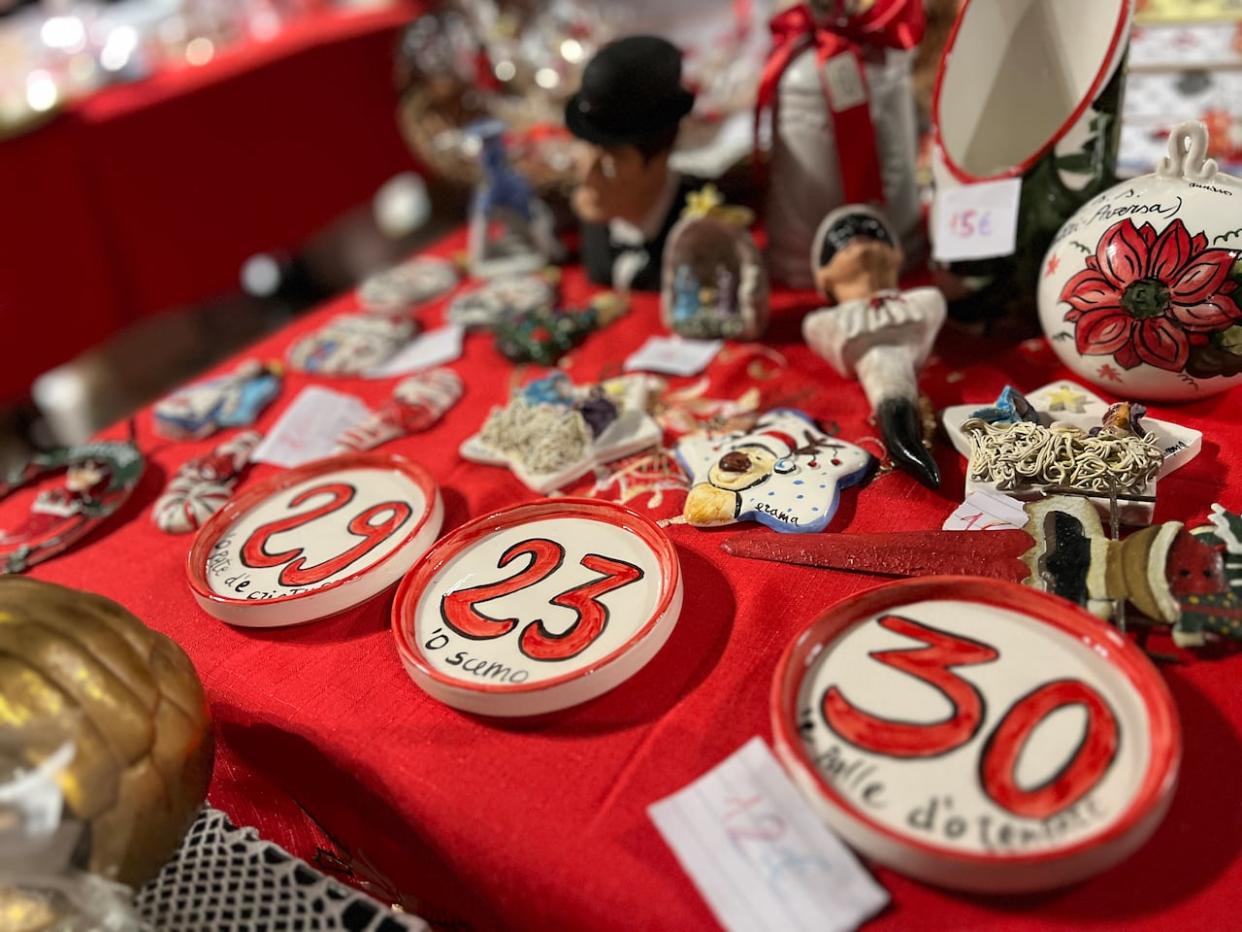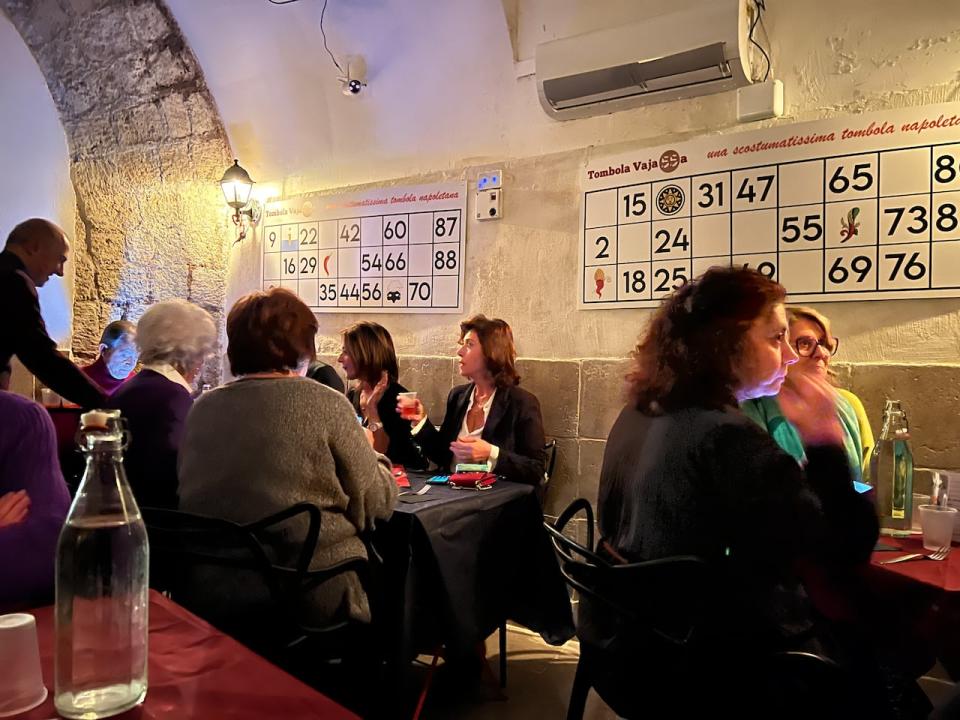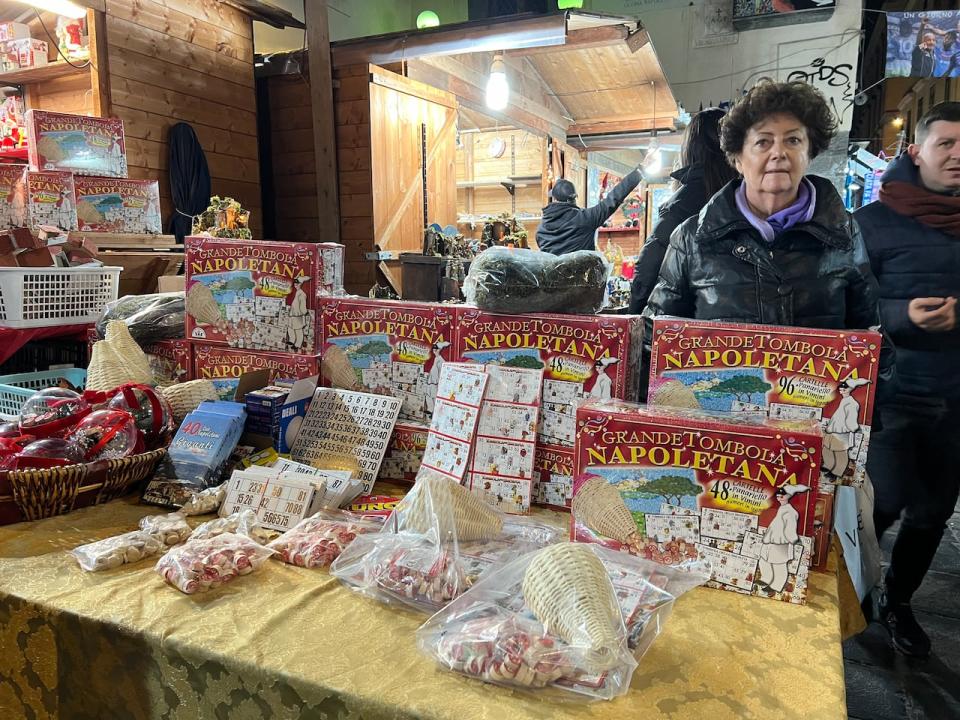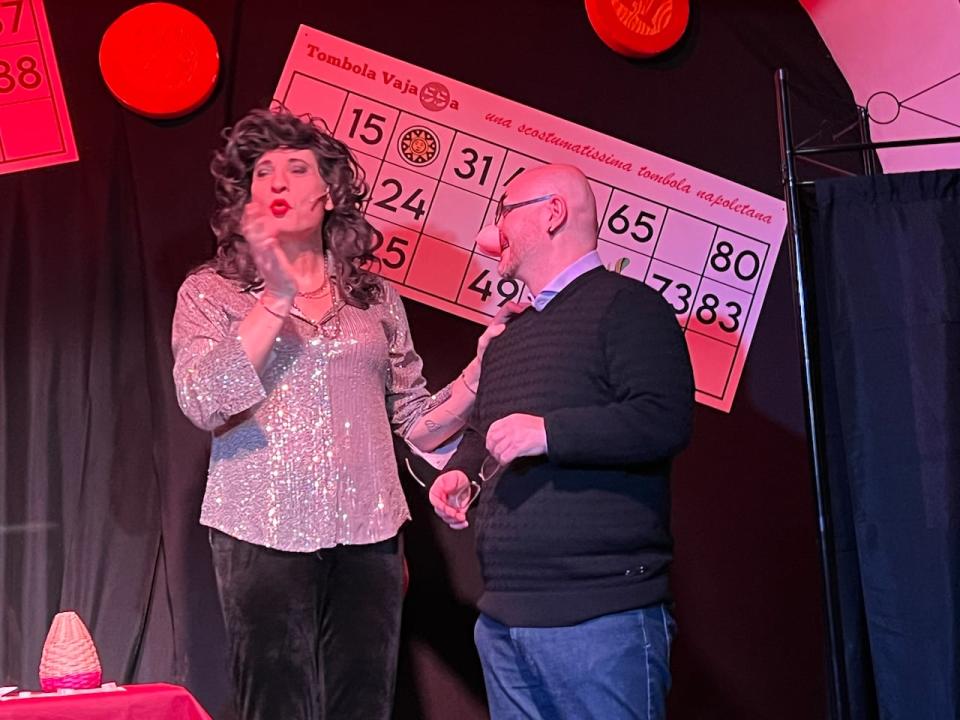Shadowy underground origins of Italian 'tombola' bingo still alive in Naples

In a cavernous room of the Tombola Vajassa bar, located down a narrow flight of stone stairs off a side street in Naples, 30 or so mostly women sit crammed around small tables, with what look like bingo cards laid out in front of them.
On a small stage, a towering figure in a cascading curly wig and silver sequined top, who goes by the name Lady Taboo, calls out images and their corresponding numbers: "Laughter, 19. Death that talks, 48. The hunchback, 53."
As the images get called out, players cross off numbers on their cards, while Lady Taboo cracks jokes and teases the crowd in a Neapolitan slang so fast-paced it's hard for non-locals who speak Italian to follow.
The game being played is tombola, a three-centuries-old version of bingo, born in this sprawling, boisterous southern Italian city.
It's a cryptic game of luck with underground roots of being run by women and often hosted by members of Naples' non-binary "third gender," the femminielli.
But partly because of its shadowy origins, and the rise of modern bingo halls, its future is uncertain.

Patrons of Tombola Vajasso in Naples, Italy play a round of tombola. (Megan Williams/CBC)
Underground bingo in Naples
"In the north of Italy where I come from, tombola is just a game we play with the family at Christmas time. But here in Naples, it's full of superstition, jokes and elaborate stories," said Giulia Gratti, 23, a member of the crowd at Tombola Vajassa.
Indeed, the tombola played by most Italians is a much beloved, squeaky clean, Yuletide tradition.
But the Naples version is a reflection of the ancient history of this sprawling, boisterous and crime-pocketed city where the game sprang up in the early 18th century as a way for impoverished people to win small stakes in a game of luck.
At the time, Naples was under Spanish rule and King Charles II banned the public lottery (or lotto) for religious reasons. To get around the prohibition, Neapolitans moved the game of chance inside their homes, devising a new set of rules that became tombola.
For centuries, tombola has been played in small, often one- or two-room street-level apartments in crowded neighbourhoods called i bassi, in the lower areas of the city, closer to the Bay of Naples.
Listen | Megan Williams takes us down a Naples sidestreet to play a game of tombola:
Part of local female economy
"Because it was played inside people's homes — the domestic sphere where Neapolitan women looked after children while doing piecework for leather goods or clothing — it became a purely female game," said Alessandra Broccolini, an anthropologist at Rome's Sapienza University.
"Men, when they weren't working, played cards at a bar or club and were only home if they were sick or under house arrest."
The game was woven not only into the social fabric of the city's poorer areas, she explained, but was also an integral part of the local female economy.
"The prizes have been small amounts of cash," she said, "and for centuries, it was a way for women to make some extra money by renting out their front room and by selling coffee and snacks, and, of course, by winning."

Tombola games for sale on the streets of Naples. (Megan Williams/CBC)
Cryptic language and dreamlike imagery
The images associated with tombola numbers are called smorfie, which is derived from the Greek word sphinx, reflecting the divination powers Neapolitans attribute to the numbers.
Broccolini said they're part of an ancient practice of assigning mystical significance to letters and numbers, with possible links to Kabbalah, a medieval form of Jewish mysticism.
They're also reflections of the dreams, fears, beliefs and commonplace Neapolitan figures: three is cat; 18 is the Madonna; 37 is the monk; 62 is a murdered body; 79 is a thief; 87 is lice, and 90 is la paura, fear.
The smorfie, too, provide a kind of encrypted form of communication linked to the game's underground origins, and this use of coded language is also what led to the involvement of LGBTQ people, according to experts.

Lady Taboo hands out a prize for four in a row during a game of tombola at Tombola Vajassa in Naples, Italy. (Megan Williams/CBC)
LGBTQ connections
"When women began playing tombola, they turned to the femminielli to call out the numbers. As gay men, they were highly adept at playing with coded language and slang, and they called out the images associated with the numbers, instead of the actual numbers, as a way to avoid detection," said Lady Taboo, whose real name is Diego Sanchez. "So instead of calling out 'number one,' they'd call out 'Italia!,' which everyone knew was the image for number one. Or for number six, which is the vulva, they'd call out 'the one who faces downwards.'"
Paolo Valerio, a clinical psychologist and an expert on femminielli and LGBTQ culture in Naples says the southern Italian city is the only major European metropolis where this "third sex" figure has been embraced.
"The femminiello emerged in the 1500s in Naples because there was no Spanish inquisition here — Neapolitans revolted against it," he said. "So the three main inquisition crimes — witchcraft, heresy and sodomy, where those found guilty were burnt at the stake — in Naples, they weren't at risk. So homosexuals came here as a safe haven."
Valerio also says they were considered lucky.
"Femminielli are considered people who are 'in between,' liminal. Not one sex or the other. And in Naples, this in-between state is viewed as bringing good luck. So they're the ones who extract the numbers," he said.

Psychiatrist and gender expert Paolo Valerio in his Naples apartment. (Megan Williams/CBC)
Neapolitan tombola's future
Today, the original Neapolitan version of tombola is played increasingly as a part of a folkloristic re-enactment for Italian tourists and Neapolitans from higher social classes.
After her performance at the Tombola Vajassa (Neapolitan slang for "woman of ill repute), Lady Taboo hustled off, explaining that she was heading to the private home of an anti-mafia prosecutor under 24-hour police protection who can't risk going out in public lest he be murdered. There, she was hosting a private tombola for his family and friends.
While Lady Taboo and others are working to keep the Neapolitan spirit of the game alive, over the past several decades, it's largely vanished from the bassi of Naples.
With the decline of movie going, cinemas have been turned into bingo halls in Italy. And the women who once hosted and played tombola in the tiny apartments in the poorer neighbourhoods have moved to playing the global game of bingo in big, brightly lit rooms that are a far cry from where the once popular Neapolitan game of tombola was played.

